Get Real! Face Reality and See What Will Become of Us Again!
Jisun PARK_Producer Group DOT
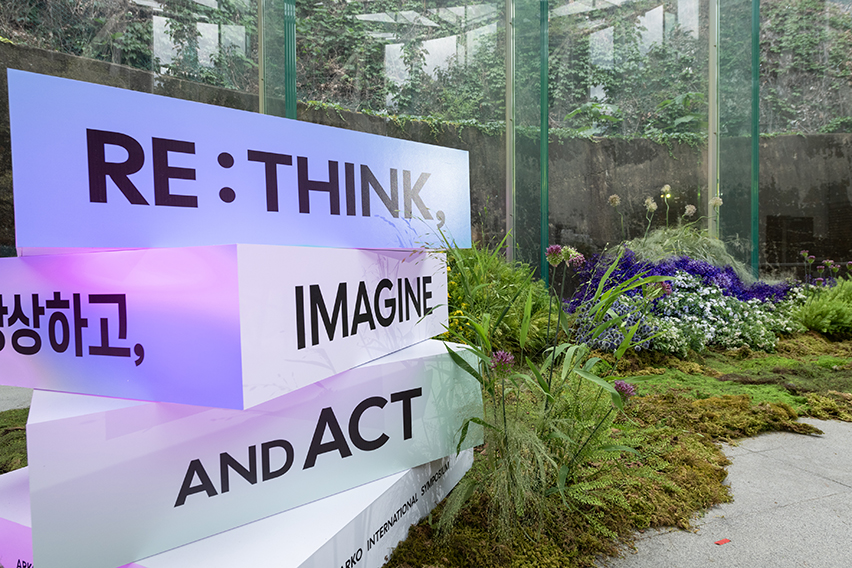
ARKO International Symposium ⓒCourtesy of ARKO International Symposium
In 2021, when we faced the crisis of connection and mobility amid the pandemic, the ARKO international Symposium was held, with the title Re:Connection. Following that is this year's symposium, titled Re Think, Imagine and Act, held on the 7th and 8th of June. The impact of the COVID-19 pandemic was felt across the globe, and there are calls for different ideas and actions than those used before to be used against the crisis faced by the human race, as is reflected in the title. It makes us think what art should be, and what roles it must play as it faces the crisis.
It is true that, so far, the average human standard of living has continued to rise, with the development of science and technology. However, now we are often told that the survival of mankind cannot be sustainable in the way it is now. And the ‘climate crisis’ is at the center of this discussion. As the Intergovernmental Panel on Climate Change (IPCC)'s report clearly proved, the crisis is caused by human impact, and the experts are saying that the debate on the cause of the climate crisis is over. To quote Einstein, 'we cannot solve problems with the same mindset that created them.' It is time for a whole new level of ideas, imaginations and actions.
The two thematic keywords of the symposium were 'creative friction and post-anthropocentrism.’ Friction, in classical dynamism, means any force that interferes with motion. In a social context, friction is used in a negative sense as something that occurs in relationship building, and the most extreme friction is 'war'. However, is it possible to consider friction only in a negative sense? Without friction there would be no motion, and no productive force would be created. Is it possible to eliminate friction, or build a world where friction does not exist? In the era of digitalization we are living in now, Bill Gates describes user-friendly technology with the term 'friction-free'.
Generally speaking, when users don’t have to think ‘why?’, ‘friction-free’ means user-friendliness. In a world where everything, including living space, shopping, and movement is conveniently systemized with technology, a “friction-free society” paralyzes people by putting convenience and efficiency as the highest value. People live in the fiction that is a frictionless society, and ignore the friction that occurs elsewhere. Fiction used to be the domain that belonged only to art. However now the world of fiction exists in reality, and it is time for art to create a new fiction. It is necessary to expose existing friction, and create new friction in a productive and creative way. And that is in line with the second keyword of this symposium, post-anthropocentrism. Breaking away from the belief that only humans on Earth have intellectual ability, art must create creative friction with various life forms on Earth, such as humans, animals, plants, microorganisms, and machines, and present a new world, imaginations and actions based on the philosophical foundation of post-humanism that goes beyond anthropocentrism.
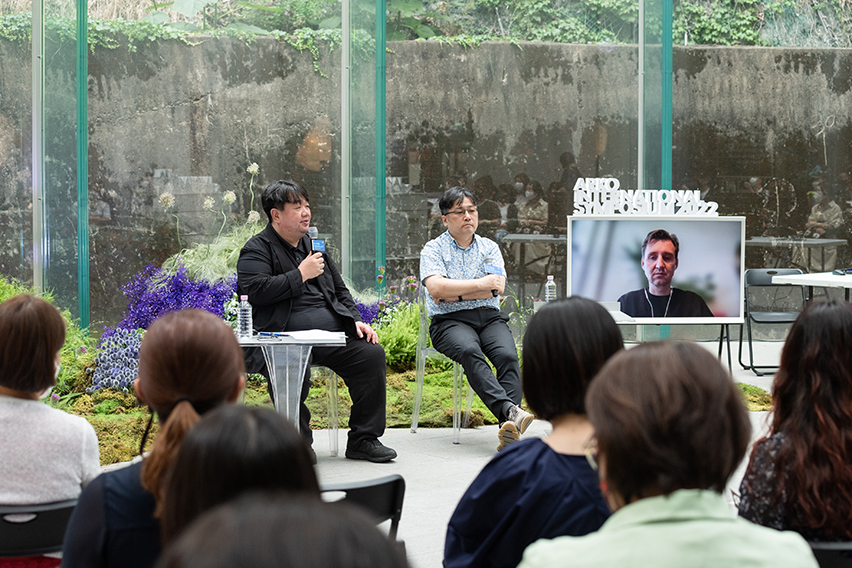
Prof. Yi Sang Wook ⓒCourtesy of ARKO International Symposium
The first topic discussed in the symposium was post-humanism. Professor YI Sang Wook from the Department of Philosophy and Department of Artificial Intelligence at Hanyang University examined how ecological thinking, climate change, and post-anthropocentrism are connected through a theoretical approach to post-humanism, and talked about how the discussion of post-humanism is directly related to the topic of artificial intelligence.
First, if we look at humanism, it has different values in different eras. Then the concept of human rights emerged during the social revolution of the 18th century, and the wide spread of humanism. After that it has been constantly redefined throughout history. He emphasizes that post-humanism also began by asking ‘What is human dignity?’ and ‘Are only human beings dignified?’, both fundamental questions about human dignity that have been continuously and for a long time examined in traditional humanism. There were movements to grant citizenship to butterflies, to give protection to individual butterflies in South America, or to grant legal personality to rivers, in order to prevent the pollution of the Ganges River and to preserve it. Although unsuccessful, these can be seen as concerns and efforts made for the sake of non-human dignity. Professor YI Sang Wook emphasizes the importance of balancing the rights and interests of the ecosystem in the era of climate change, and proposes proper awareness of artificial intelligence, and cooperation in such an approach. Because AI works very differently from humans, interacting with AI thinking that it is like humans can cause a lot of issues. He says it is necessary for us to recognize that AI is an unfamiliar intelligence, different from that of humans, and to think about how we must interact with machines in order to make the world we live in safer and more desirable. In other words, rather than applying anthropocentric values to machines, we must work with unfamiliar intelligence to create a methodology for interaction, not only with machines but also with other non-humans. An example of this can be found in a lab which is run by director Jarl Schulp, Director of the FIBER Festival held in Amsterdam, the Netherlands. This lab converges art, science, technology, philosophy, and archeology, and in it he has created an art piece by combining barnacle scans and GPT2 artificial intelligence. Currently, artificial intelligence is learning data not only about barnacles but also from science fiction. Only a few changes in the AI parameters will generate interesting stories about how non-human creatures see people. In this way, it is possible to give a voice to a rock. This exploration is allowing us to escape our human-centric mindset, and present interesting storytelling from a decentralized perspective.
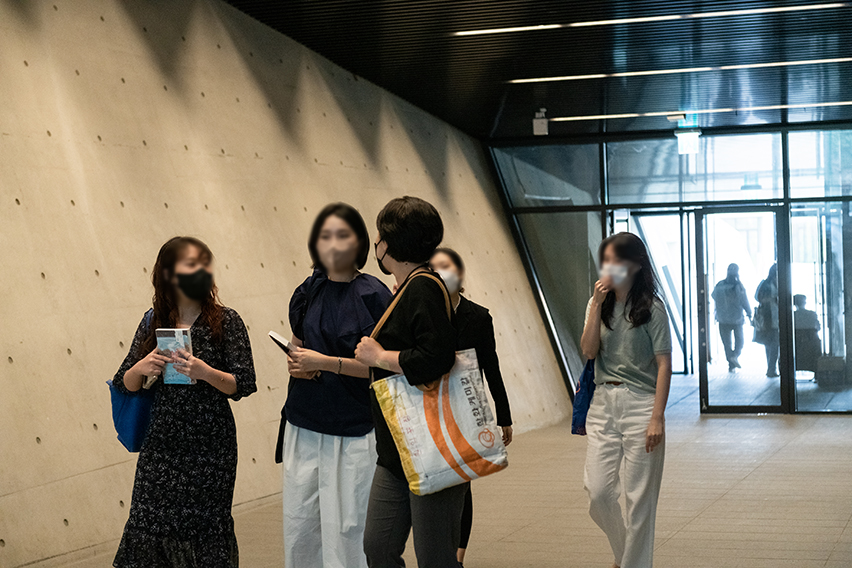
Event Venue ⓒCourtesy of ARKO International Symposium
Due to the threat that climate change will herald the end of mankind, there are increasingly more discussions on post-anthropocentrism and post-humanism. Although the artists participating in the symposium work in different ways, they all focused on climate change, and ideas about non-humans. Katie Michell, a British director of theater and opera, is an artist who, when she came across the scientific facts about climate change in 2011, tried to bring the issue without delay to the stage. At first, she tried to deal with climate change in a theater format that everyone is familiar with. However, she realized that anthropocentric theater practices could reinforce this problem, as it is the anthropocentrism that has driven mankind into the climate crisis. Therefore, she continued to explore; how theater can change attitudes towards climate change and the human world; how to change the politics of expression in theater productions; and how best to convey messages about the crisis of climate change. Many artists, including Katie Mitchell, refer to climate change as a hyperobject. The scale is too large, there are many intervening factors, and people do not understand it properly because it exists across various times and spaces. Climate change manifests differently in different places. In some places, it has already manifested, while in some other places, it could appear 10 years later. It unfolds differently in time and space. Therefore, it is difficult to understand, and global warming and the accompanying ecological crisis are not well understood. For the first few years, Katie Mitchell worked with scientists to create works in the form of lecture performances, so that it would appeal to the intellect of the audience to whom she wanted to introduce the hyperobject, i.e. climate change. In the process, she learned that this approach made people deny fear and reality, which led her to explore various other approaches, including works that appealed to emotions, or works that did not use electricity, thus reducing the carbon footprint. Currently she is preparing a work that puts the non-human world center stage. This work is Anton Chekhov’s The Cherry Orchard seen from a tree’s point of view. It is an experiment that examines what happens when a cherry tree replaces a human at the center of an anthropocentric theater, and whether what is left when that happens can be called theatrical. The work The Legal Status of Ice, presented at Jarl Schulp’s FIBER Festival, also showed the hyperobject system on a smaller scale. The work explores several important questions as it reveals how the conflict among many countries over the extraction of oil and gas resources in the Arctic is changing the landscape of the already melting polar region. What visuals or methods can we use to deliver the truth of climate change, and let the complexity of its impacts and origins be known? To answer this question, what role can sensuous art, design, and the performing arts play? Can multisensory composition, image making or guessing be used as new ways of thinking? There were many questions that the artists participating in the FIBER Festival and the symposium tried to find answers for, through various studies and works. The FIBER Festival proposed the imagination and thinking of a world without fossil fuels in their climate imagination projects. With ‘variation’ as a way of thinking, artists tried to find new strategies or new ways to change ourselves or to adapt to a changing world.
Ton van Gool, director of another Dutch festival STRP, selected post-Anthropocene as a theme in 2020, and the end of infinity in 2022. He and the artists envisioned a world where humans no longer exist, asking fundamental questions about whether a world without humans can sustain itself, and about humans who increasingly refuse to accept death. In recent years, many artists have been creating climate change and non-human narratives. However, these narratives are often too fixated on two axes: the catastrophe of mankind, or the romantic salvation. The artists participating in the symposium had a belief that art could truly ponder upon alternative futures. They are telling us to shout "Get real! Face reality!" and start a thematic exploration of who we are and what we will become.
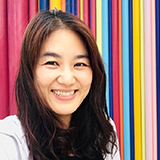
Jisun PARK
Jisun PARK is a producer working across various fields of art, including theater, dance and multi-disciplinary arts. She organizes and directs festivals, residency programs, productions and international networking groups. Recently, she has been researching the contemporaneousness of art, while exploring various themes including city, borders, technology and art, climate and art, etc. with other artists. She worked as a Program Directorr ARKO International Symposium 2022.








 PREV
PREV
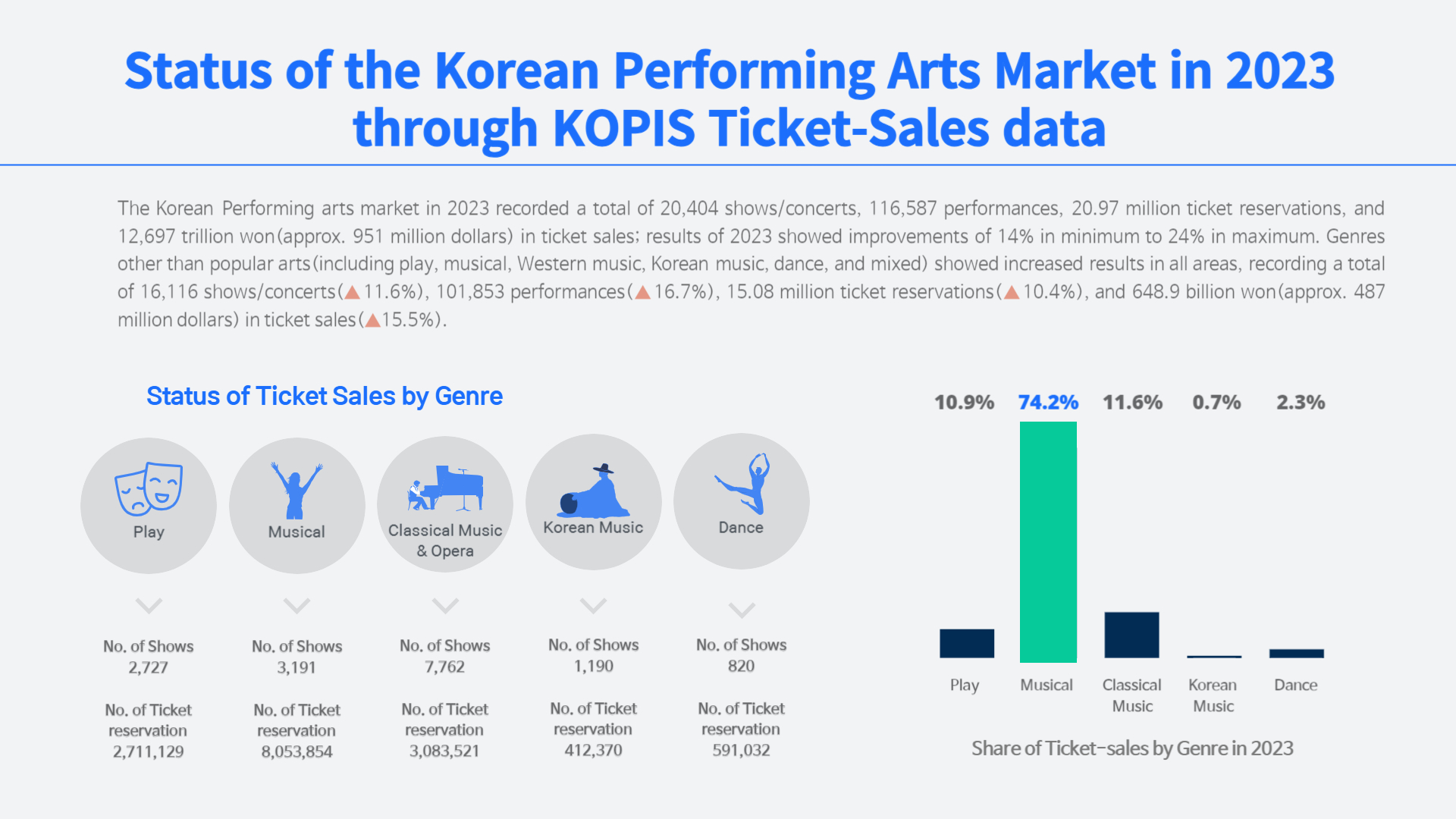
.jpg)
.jpg)
.jpg)
.jpg)











